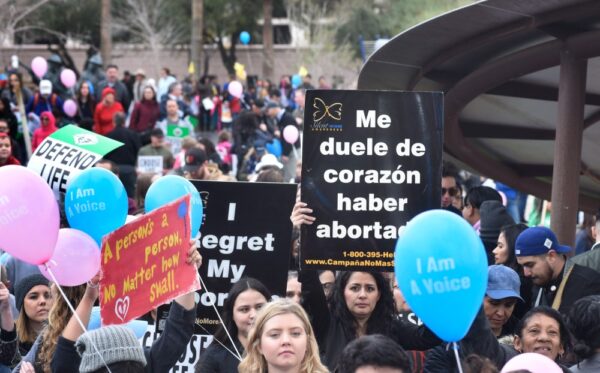
WASHINGTON – While Arizona’s Catholic bishops and state and local pro-life groups were pleased with the ruling by the state’s Supreme Court April 9 — which let stand an 1864 law banning abortions — they also cautioned Arizonans to vote against a proposed amendment on the November ballot that would undo this ban.
The 160-year-old state abortion law that can now remain enforced carries a sentence of two to five years in prison for doctors or anyone else who assists in an abortion. The only exception is when the mother’s life is in danger. The court also noted that the law passed by the Arizona Legislature in 2022, prohibiting abortions after 15 weeks, did not repeal the abortion law that was in existence even before Arizona was a state.
“We acknowledge that today’s opinion by the Arizona Supreme Court on abortion is currently the law of the land. By a 4-2 decision, the Court ruled that Arizona’s pre-Roe law protecting unborn human life from the moment of conception, with a life of the mother exception, is still valid,” the Arizona bishops said.
“Nonetheless, we are also aware that a far-reaching pro-abortion initiative is being circulated that, if approved by voters, will ultimately dictate Arizona law in this regard,” they said in a statement issued April 9 by the Arizona Catholic Conference.
The state’s four bishops said the proposed ballot initiative on abortion “would likely remove most safeguards for girls and women that are currently in place at abortion clinics, permit a minor to obtain an abortion without parental involvement or permission, and allow for painful late-term abortions of viable preborn children.”
“We do not believe that this extreme initiative is what Arizona wants or needs, and we continue to pray that it does not succeed,” they said.
The court said enforcement of the state’s abortion ban won’t begin for at least two weeks and it could take up to two months, based on an agreement reached in a related case in the state.
“In light of this opinion, physicians are now on notice that all abortions, except those necessary to save a woman’s life, are illegal,” the Arizona Supreme Court said in its decision. The law provides no exceptions for rape or incest.
Republican state leaders have been cautious in backing the court’s ruling.
Former Republican Gov. Doug Ducey, who signed the state’s current law restricting abortion after 15 weeks, posted on social media that the ruling “was not the outcome I would have preferred.” Responses to his post on X, formerly Twitter, pointed out that he appointed five of the state’s current Supreme Court justices.
Ducey’s post urged elected leaders to find an abortion policy “that is workable and reflective of our electorate.”
In a video post on Facebook, Arizona Right to Life said it was “delighted that the court regulated and upheld Arizona’s long-standing history of protecting the unborn and their mothers” and the group would now “work tirelessly to educate voters” about the likely ballot initiative that “would legalize abortion up to birth, their word, after fetal viability.”
Marjorie Dannenfelser, president of Susan B. Anthony Pro-Life America, similarly called the court’s decision an “enormous victory for unborn children and their mothers” but also stressed that the pro-life movement will now work to defeat the state’s ballot initiative on abortion.
“The compassion of the pro-life movement won in court today, but we must continue to fight,” she said in a statement.
The group, Arizona for Abortion Access, which has been working to get a constitutional amendment on the state’s ballot enshrining abortion access, said the court’s ruling would motivate more people to join their campaign ahead of the state’s July 3 deadline for signatures. They announced in early April that they had gathered more than 500,000 signatures — surpassing what was needed to get an initiative on the Arizona general election ballot.
The proposed ballot initiative would amend Arizona’s Constitution to prohibit the state from legislating against abortion up until fetal viability, around 24 weeks into a pregnancy, and would also place other abortion protections into law.
Arizona is one of at least 12 states where voters may be voting on abortion rights in the November elections.
